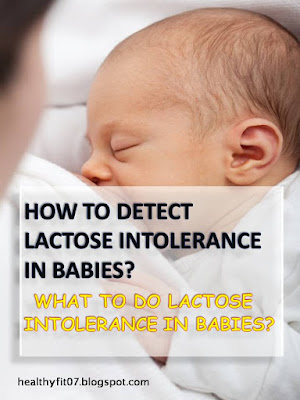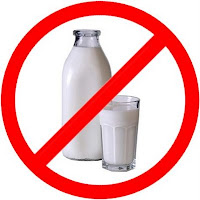 |
| LACTOSE INTOLERANCE |
What Is Lactose Intolerance?
Lactose is a natural sugar mostly found in dairy items. If a baby
cannot digest this lactose present in milk, it is called lactose intolerance.
Intolerance happens when the enzyme lactase needed to digest this lactose is
not secreted in sufficient amount in the baby’s gut. In turn, the baby will
have problems in the digestive system since the milk stays inside the stomach
in an undigested form.
Do You Think Your Baby Is Lactose Intolerance?
Symptoms Of Lactose Intolerance
In Babies
In the absence of lactase, the lactose present in the milk does not digest
and stays in the gut. As a result, the bacteria in the gut eat the lactose and
produce large amounts of gas. This causes a wide range of symptoms including:
·
Noisy bowel
sounds and wind
·
Vomiting
·
Crankiness
·
Unable to settle
·
Coming on and off the breast during
breastfeeding
·
Frequently
crying
·
Malnutrition, unable to gain weight
Causes Of Lactose Intolerance In
Babies
There are two types of lactose
intolerance: PRIMARY and SECONDARY.
1.
Primary lactose intolerance:
When babies are born with a lack
lactase enzymes (the enzyme that digests lactose) at all is known as Congenital
Lactose Intolerance. Primary or Congenital Lactose Intolerance extremely rare
and occurs due to genetically
inherited metabolic disorder. This kind
of lactose intolerance in babies is recognized by severe diarrhea from the
first day of life. These babies with congenital lactose intolerance need a specially formulated
lactose-free diet to thrive.
2.
Secondary lactose intolerance
Secondary
lactose intolerance is noticed when child’s digestive system is disrupted
by something like gastroenteritis,
which cause temporary irritation of the lining of the gut and reducing the
amount of lactase production. Secondary lactose intolerance is temporary and generally
improves 2-3 week after the causative illness subsides.
Conditions that
causes of secondary lactose intolerance: Gastroenteritis, Coeliac disease, parasitic
infection, food sensitivity, Crohn’s disease, oral rotavirus vaccine or after
use of antibiotic. Secondary Lactose intolerance should not be a problem once
these conditions are taken care properly.
What To Do Lactose Intolerance In
Babies?
You might be encouraged to take out lactose from your infant's daily
diet, when lactose intolerance is suspected. You need to do this under the supervision
of a pediatric medicinal expert, who will give exhortation about guaranteeing
your child still get nourished with the supplements required for overall growth
and improvement. Supplementing calcium needs extraordinary consideration. Minerals
like, calcium and vitamin D, is typically associated with lactose-rich dairy
products and which can influence your child’s bone and teeth development.
]
Switch the
baby to soy based formula. Soy protein based formula milk contains corn syrup
solids rather than lactose and this can be given to these babies.
]
Milk are also
available that has been ultra-heated to break down the lactose. However, these
milks costs twice as much as the regular, but it is far cheaper in
consideration to the protein-based formulas.
]
Other than milk,
there are many options these days, which are alternative to cow's milk like soymilk-derived
curd, almond milk, peanut milk or soy yogurt.
]
You could
also try switching to goat's milk. Some children who are lactose intolerant
only have issues with cow's milk.
]
If you're
worried about compensating the calcium when you avoid milk to your lactose
intolerance baby or kid you can give lot of calcium rich foods to them examples
are beans, avocado, eggs and vitamin D supplements on consultation with a
doctor.
]
Do not
forget to check the label while purchasing milk and dairy products for your
lactose intolerant baby. Even a small amount of lactose in products like
cheese, ice cream and other desserts may intricate tummy upset in your baby.
Even processed meats and foods, Bread and bread products, Breakfast cereals,
Cakes, Biscuits may contain lactose.
The lactose levels of some common foods:
1. Glass of milk (200ml) 9g lactose
2. Carton of yogurt (125g) 5.9g lactose
3. Fromage Frais (60g) 1.8g lactose
4. Cheddar cheese (30g) 0g lactose
5. Cottage cheese (40g) 1.2g lactose
6. Milk chocolate bar (54g) 5.5g lactose
7. Bowl of rice pudding (200g)
7.8g lactose
LACTOSE
OVERLOAD and LACTOSE INTOLERANCE
Lactose overload and lactose intolerance are not
the same. Lactose overload not related to the production of
lactase. Lactose overload happens when a baby fed with large amounts of lactose
containing diet at one time and having problem to digest. Overloading your baby
with both breast milk and cow's milk or formula meal can cause an injured gut,
which leads to signs of lactose intolerance.
How To Avoid Lactose Intolerance Due To Lactose Overload?
v
Hence, do
not overload the young tummy with too many types of milk.
v
Breast milk
is more than sufficient for a baby. You can always choose to stop the formula
milk or cow's milk instead to avoid possibility of lactose overload.
v
If symptoms
of lactose overload perceived in your child, ensure to feed your baby a
position so that sucks all the milk from each breast.
v
Make
your baby to feed from one breast only for a 4-hour slot before moving onto your
other breast for the next 4-hours.
v
If you
suspect over-feeding is causing the overload, avoid to feed more often than
every three hours.
Does Breast Milk Also Cause
Lactose Intolerance?
As stated earlier babies with
congenital lactose intolerance (lack in lactase-the lactose digestive enzyme), need a
specially formulated lactose-free diet. Consult your doctor to make sure of congenital lactose intolerance before stop
breastfeeding or switch to formulas.
However, for a breastfed baby with secondary lactose Intolerance
never substitute breast milk with lactose free formula. For a breastfed baby
with secondary lactose intolerance caused by gastroenteritis, you should be
able to continue breastfeeding. Since breast milk has so many essential
nutrients and lactose is good for your baby’s growth, weaning is not
recommended. Usually your child tolerate small amount of lactose present in
breast milk and breast-feeding will help the baby to increase the ability to
produce more lactate. Usually secondary lactose intolerance is noticed when something that has irritated the gut and breast milk
can help your baby’s gut to heal.
The intolerance to lactose is generally from the cow's milk or
formula prepared with it. So if a baby is lactose intolerance do not stop
breastfeeding. Breastfed baby may have allergy to cow’s milk protein, if the lactating mother removes
cow’s milk protein from her diet, the secondary lactose intolerance in her baby
will wane.
Lactose Intolerance In Breastfed
Babies
Switch the baby to soy based formula. Soy protein based formula
milk contains corn syrup solids rather than lactose and this can be given to
these babies. Even some formulated lactose-free
diet may contain cow’s milk protein. Be sure that your baby is not allergic to cow’s milk protein before feeding your baby. Consult a
pediatric dietitian to choose the correct formula diet that contains all the
essential nutrients for your baby growth.









Comments